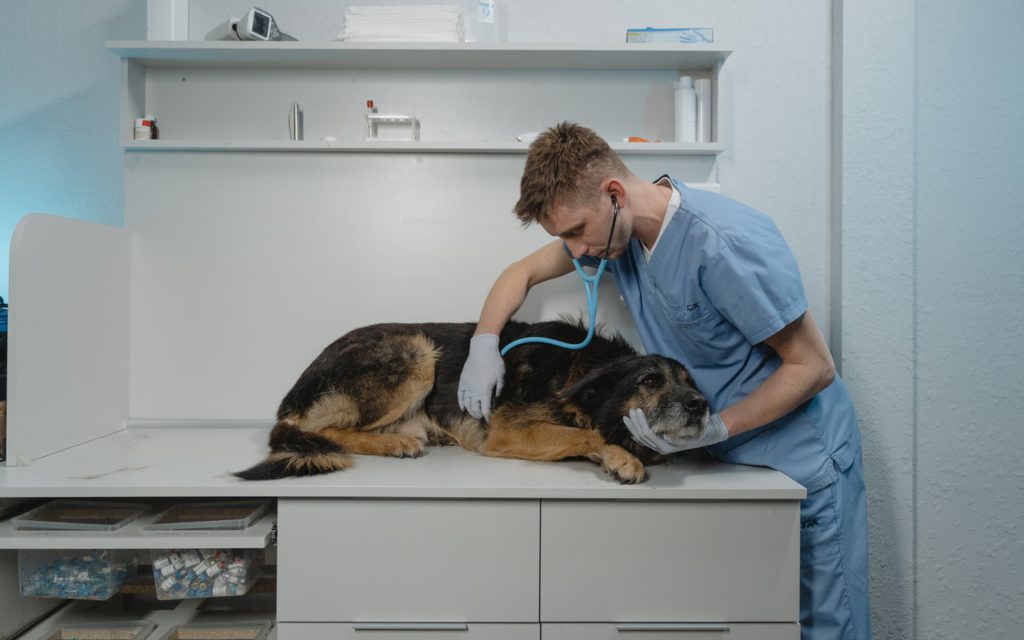If you think your dog has a food allergy or sensitivities to ingredients in his regular food, it’s important to find out what the problematic ingredient is in order to eliminate it from the diet while still maintaining optimal nutrition. After a thorough examination, if your veterinarian believes that your dog may be suffering from the consequences of a food allergy or food sensitivity, he will likely recommend that your dog be placed on an elimination diet. If symptoms resolve while your dog is on an elimination diet, your veterinarian may ask you to return to regular food to see if allergy symptoms reappear. The symptoms of allergies in dogs can be similar to some illnesses and infections, however, it is very important that your dog is examined by a veterinarian as soon as possible if you notice that he suddenly develops a food allergy.
Although food allergies in dogs are much less common than other types of allergies, puppies with food allergies may experience unpleasant symptoms such as rashes or indigestion that affect their quality of life. Skin allergies, food allergies, and environmental allergens all create problems for dogs and their owners, and to make matters worse, skin allergy symptoms can overlap. Allergy symptoms can look very similar no matter what your dog is allergic to (be it food, pollen, perfume, or whatever). Food allergies can also manifest as skin conditions or hair loss, so pay attention to your dog’s skin and coat problems to determine if your pet might have one.
Persistent itching can be very severe for dogs, so when dogs suffer from food allergies, you may notice changes in their behaviour. Sometimes dogs experiencing food allergies also have environmental allergies, which can cause allergic skin disorders (atopy). Additionally, some dogs may be allergic to soy or gluten in wheat and similar grains. Food allergies in dogs can be very serious, causing not only digestive problems like vomiting and diarrhea but also skin problems and even behavioural problems.
Foods that your dog hasn’t had a problem with for years may trigger an allergic reaction suddenly, or symptoms appear soon after your dog’s diet changes. Even if you feed your puppy healthy dog food, something in his diet can cause a reaction, possibly over time.
You may then establish which foods cause allergic responses in your dog by adding an appropriate variety of foods to his diet. The strict hypoallergenic diet test cannot contain ingredients your dog has recently eaten; There are several diets specifically designed to prevent food allergies. It’s important to go through the process of diagnosing your dog’s allergies and not assume they have a sensitivity to chicken or any other ingredient in their food. According to the dog grooming Perth society, your pet can be groomed for this identification.

Even if your veterinarian discovers the “cause” of your dog’s skin problems, they may still suspect that an adverse food reaction is at least partly to blame, as a yeast infection can occur due to, for example, food allergies. If your dog’s symptoms have no other obvious cause, your veterinarian may begin to suspect a food allergy behind your dog’s itchy skin or ear infection.
Because many things can cause diarrhea in dogs, it’s important to work with your veterinarian to find out the root cause, find out if it’s related to a food allergy, and find a long-term solution. In addition to possibly requiring lifestyle changes, your veterinarian may also prescribe an allergy medication for your dog to help manage signs associated with allergic reactions, such as itching and any secondary skin infections that may develop as an allergic reaction. The result of an allergic reaction.
If your dog moves backwards a lot, your veterinarian may want to check his anal sac, as anal sac problems are also often associated with food allergies. The most common areas of itching in dogs with food allergies are the ears and paws, which may be accompanied by gastrointestinal symptoms. Dog food is one of the biggest culprits in causing allergic reactions in dogs, and owners often overlook it because it’s easy to attribute itching or licking to environmental factors that cause skin irritation. In true dog food allergies, the culprit is usually a food protein that triggers an adverse immune response that then causes the body’s cells to release histamine, or compounds, that cause itching and many other allergic symptoms.
Dogs and cats can be allergic to almost any protein or carbohydrate ingredient found in pet food. Dogs with food intolerances may show a variety of symptoms, including gastrointestinal signs such as vomiting and diarrhea, or dermatological signs such as itching, poor skin and coat, and chronic ear or hoof infections.
